(完整版)八年级上册一般将来时用法讲解及练习
最新八年级上册一般将来时用法讲解及练习
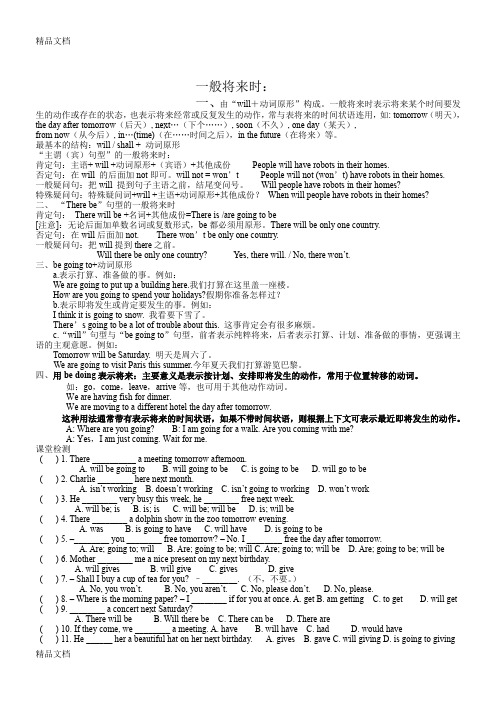
一般将来时:一、由“will+动词原形”构成。
一般将来时表示将来某个时间要发生的动作或存在的状态,也表示将来经常或反复发生的动作,常与表将来的时间状语连用,如: tomorrow(明天),the day after tomorrow(后天), next…(下个……), soon(不久), one day(某天),from now(从今后), in…(time)(在……时间之后),in the future(在将来)等。
最基本的结构:will / shall + 动词原形“主谓(宾)句型”的一般将来时:肯定句:主语+ will +动词原形+(宾语)+其他成份People will have robots in their homes.否定句:在will 的后面加not即可。
will not = won’t People will not (won’t) have robots in their homes.一般疑问句:把will 提到句子主语之前,结尾变问号。
Will people have robots in their homes?特殊疑问句:特殊疑问词+will +主语+动词原形+其他成份?When will people have robots in their homes?二、“There be”句型的一般将来时肯定句:There will be +名词+其他成份=There is /are going to be[注意]:无论后面加单数名词或复数形式,be都必须用原形。
There will be only one country.否定句:在will后面加not. There won’t be only one country.一般疑问句:把will提到there之前。
Will there be only one country? Yes, there will. / No, there won’t.三、be going to+动词原形a.表示打算、准备做的事。
人教版英语八上时态专讲--一般将来时讲义+习题

人教版英语八上时态专讲--一般将来时讲义+习题一般将来时一般将来时表示将来某一时段的动作或状态,或将来某一段时间内经常的动作或状态。
Will+be will+do含义:一般将来时表示将来某一时刻的动作或状态,或将来某一段时间内经常的动作或状态。
结构:①Will/shall+动词原形肯定句:主语+will/shall+动词原形+其他否定句:主语+will/shall+not+动词原形+其他一般疑问句:Will/Shall+主语+动词原形+其他肯定回答:Yes,主语+will/shall;否定回答:No,主语+will/shall not.特殊疑问句:特殊疑问词+一般疑问句②be going to+动词原形肯定句:主语+be(is/am/are)+going to+其他否定句:主语+be(is/am/are)+not+going to+其他一般疑问句:Be(Is/Are)+主语+going to+其他? 肯定回答:Yes,主语+be/否定回答:No,主语+be not.特殊疑问句:特殊疑问词+一般疑问句表示将来的时间状语:tomorrow(明天), next week(下周);in the future(将来);in a year(一年以后)等。
一般将来时由助动词shall(第一人称),will(所有人称)动词原形构成。
美式英语则不管什么人称,一律用will。
或用主语+be动词 + going to 动词(be going to)复习:用法:一般将来时表示将来某一时段的动作或状态,或将来某一段时间内经常的动作或状态。
在英语时态中,"时"指动作发生的时间,"态"指动作的样子和状态。
表示将来的时间状语:tomorrow,the day after tomorrow,tomorrowmorning/afternoon/evening/next/year/week/month/hour/ in+一段时间,in the future等连用。
人教版英语八年级上册Unit6一般将来时语法详解及练习
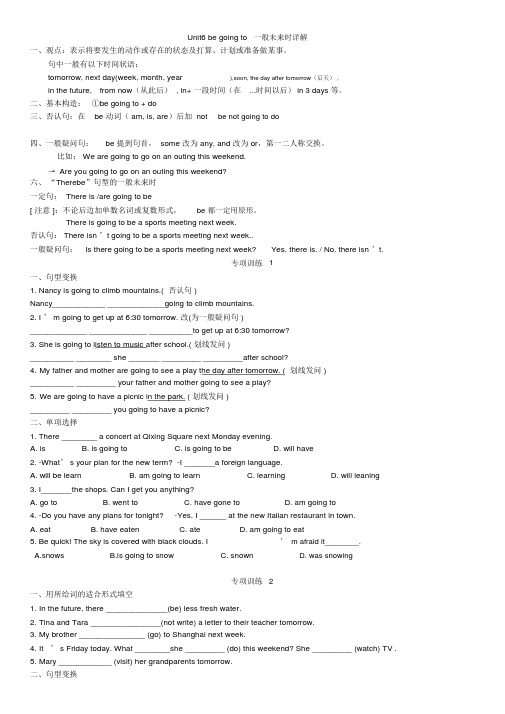
Unit6 be going to一般未来时详解一、观点:表示将要发生的动作或存在的状态及打算、计划或准备做某事。
句中一般有以下时间状语:tomorrow, next day(week, month, year),soon, the day after tomorrow(后天) , in the future, from now(从此后) , in+ 一段时间(在...时间以后) in 3 days 等。
二、基本构造:①be going to + do三、否认句:在be 动词( am, is, are)后加 not be not going to do四、一般疑问句:be 提到句首, some 改为 any, and 改为 or,第一二人称交换。
比如: We are going to go on an outing this weekend.→Are you going to go on an outing this weekend?六、“Therebe”句型的一般未来时一定句: There is /are going to be[ 注意 ]:不论后边加单数名词或复数形式,be 都一定用原形。
There is going to be a sports meeting next week.否认句: There isn ’t going to be a sports meeting next week..一般疑问句:Is there going to be a sports meeting next week?专项训练一、句型变换Yes, there is. / No, there isn ’t. 11. Nancy is going to climb mountains.( 否认句 )Nancy____________ _____________going to climb mountains.2. I ’ m going to get up at 6:30 tomorrow. 改(为一般疑问句 )_____________ _____________ __________to get up at 6:30 tomorrow?3. She is going to listen to music after school.( 划线发问 )__________ ________ she _______ _________ _________after school?4.My father and mother are going to see a play the day after tomorrow. ( 划线发问 )__________ _________ your father and mother going to see a play?5.We are going to have a picnic in the park. ( 划线发问 )_________ _________ you going to have a picnic?二、单项选择1. There ________ a concert at Qixing Square next Monday evening.A. isB. is going toC. is going to beD. will have2. -What’ s your plan for the new term? -I _______a foreign language.A. will be learnB. am going to learnC. learningD. will leaning3. I_______the shops. Can I get you anything?A. go toB. went toC. have gone toD. am going to4. -Do you have any plans for tonight? -Yes, I ______ at the new Italian restaurant in town.A. eatB. have eatenC. ateD. am going to eat5. Be quick! The sky is covered with black clouds. I’ m afraid it________.A.snowsB.is going to snowC. snownD. was snowing专项训练 2一、用所给词的适合形式填空1.In the future, there ______________(be) less fresh water.2.Tina and Tara ________________(not write) a letter to their teacher tomorrow.3.My brother _______________ (go) to Shanghai next week.4.It ’ s Friday today. What ________she _________ (do) this weekend? She _________ (watch) TV .5.Mary ____________ (visit) her grandparents tomorrow.二、句型变换1. Ken is going to keep on writing stories. ( 否认句、一般疑问句、发问Ken _________ _________ going to keep on writing stories._________ Ken ___________ to keep on writing stories?__________ _________ Ken going to ____________?)三、单项选择((((((( () 1. Ann____ mountains tomorrow morning. A. is going to climb B.climb C.climbs D.is climbing ) 2. The girl ______ a new computer for herself next year.A. buyB. buysC. boughtD. is going to buy) 3. ---_______ on Sunday? ---She is going to take guitar lessons.A. What does she doB. When is she going to take guitar lessonsC. How is she going to doD. What is she going to do) 4. My brother is going to _______ an engineer when he ________ up.A. do; growB. do; growsC. be; growD. be; grows)5. My brother is going to _______ a cook when he _______ up.A. do; growB. do; growsC. be; growD. be; grows) 6. What _____ you _____ to do when you _____ high school?A. do; want; finishB. will; want; finishC. are; going; are going to finishD. are; want; are going to finish) 7.The day after tomorrow they ________ a volleyball match.A. will watchingB. watchesC. is watchingD. is going to watch)8. There's going to ____ in tomorrow's newspapers.A. have something newB. have new somethingC. be something newD. be new something。
人教版英语八年级上册Unit7一般将来时语法详解及练习

Unit7 will一般将来时详解一、概念:表示将要发生的动作或存在的状态及打算、计划或准备做某事。
句中一般有以下时间状语:tomorrow, next day(week, month, year…),soon, the day after tomorrow(后天),in the future, from now(从今后),in+一段时间(在...时间之后)in 3 days 等。
二、基本结构:②will+ do.三、否定句:will后加not成will not =won’t。
will not=won’t四、一般疑问句:will提到句首,some改为any, and改为or,第一二人称互换。
五、同义句:be going to = willI am going to go swimming tomorrow. = I will go swimming tomorrow.六、“There be”句型的一般将来时肯定句:There will be+名词=There is/are going to be[注意]:无论后面加单数名词或复数形式,be都必须用原形。
There will be only one country.否定句:There won’t be only one country.一般疑问句:Will there be only one country?Yes,there will./No,there won’t.专项训练1一、单项选择1. I hope you ________a good time this evening.A. haveB. are havingC. will haveD. has2. There________ a basketball match this afternoon.A. will haveB. will beC. hasD. have3. We________to the park if it is fine tomorrow.A. will goB. goC. goesD. went4. The kids may not go to school in the future. They ________at home on computers.A. have studiedB.will studyC. studiedD. studies5. -Shall we hang out in Great Bazzar tomorrow?-I’m afraid not. ________the final game of the World Cup on TV.A. There isB. There will beC. There will haveD. There is going to have二、句型转换1. Students will go to school in the future.(一般疑问句) ________ _______ _______ to school in the future?2.There will be some robots in our homes.(否定句) There _______ ______ _______robots in our homes.3.My sister will go camping with her friends.(否定句) My sister ________ _______camping with her friends.4.Mike will visit his grandparents next weekend.(一般疑问句,肯定回答)_______Mike_______his grandparents next weekend? Yes, ________ _______.5.There will be more wild animals in the forest.(一般疑问句,否定回答)______ _____ ______more wild animals in the forest? No, _______ _______.专项训练2( ) 1. If they come, we ________ a meeting. A. have B. will have C. had D. would have ( ) 2. He ________ her a beautiful hat on her next birthday.A. givesB. gaveC. will givingD. is going to giving( ) 3. He ________ in three days.A. coming backB. came backC. will come backD. is going to coming back( ) 4. ________ a concert next Saturday?A. There will beB. Will there beC. There can beD. There are( ) 5. There ________ a birthday party this Sunday.A. shall beB. will beC. shall going to beD. will going( )7. There ___ a talk show on CCTV 3 at eight tonight.A. will haveB. is going to beC. is havingD. is going to have( )8. I ________ free the day after tomorrow. A. will B. will C. will be D. will am ( ) 9. Mother ________ me a nice present on my next birthday.A. will givesB. will giveC. givesD. give1. Andy will start working when she finishes high school and college.(否定句、一般疑问句、提问)Andy _________ _________ start working when she finishes high school and college.________ Andy _______ working when she finishes high school and college?________ _______ Andy ________ working?2. We will meet at the bus stop at 10:30.(改一般疑问句)_______ ________ meet at the bus stop at 10:30?。
初中英语 人教版八年级上册语法专项-一般将来时讲解+时态混合练习题(含答案)

一般将来时讲解与时态混合练习题“be going to+动词原形”是一般将来时的一种表达形式,表示将要发生的动作或情况,be动词随主语的人称和数的变化而变化。
1.肯定句:主语+be going to+动词原形+其他2.否定句:主语+be not going to+动词原形+其他.3.一般疑问句:Be+主语+going to+动词原形+其他?肯定回答:Yes,主+be.否定回答:No,主语+be not.4.特殊疑问句:疑问词+be+主语+going to+动词原形+其他?用法:(1)表示将要发生的动作或安排,或打算、计划、决定要做的事。
(2)表示主语根据当前的情况做出的预测。
通常是有迹象表明某事即将发生,表达说话人较肯定的判断,指即将发生或肯定要发生的事,常用于I'm sure,I'm afraid或I think等后面。
(3)常与be going to连用的时间状语be going to 表达的是未发生的动作,因此常与一些表示将来的时间状语连用。
例如:tomorrow,this evening,next month,in three weeks等。
有时也可与before, after等引导的时间状语从句连用。
一般将来时1)一般将来时的构成:1. 助动词will(shall)+动词原形2. am / is / are+going to +动词原形2)一般将来时的用法:1.将要发生的动作。
例如:I will leave for Beijing tomorrow.2.将要存在的状态。
例如:This time next year I will be in Japan. Where will you be?3.打算要做的事。
例如:Are you going to watch the film on television tonight?3)常用于一般将来时的时间状语:tomorrow、next week、in 2008等。
八年级上册-英语语法知识点讲解和练习
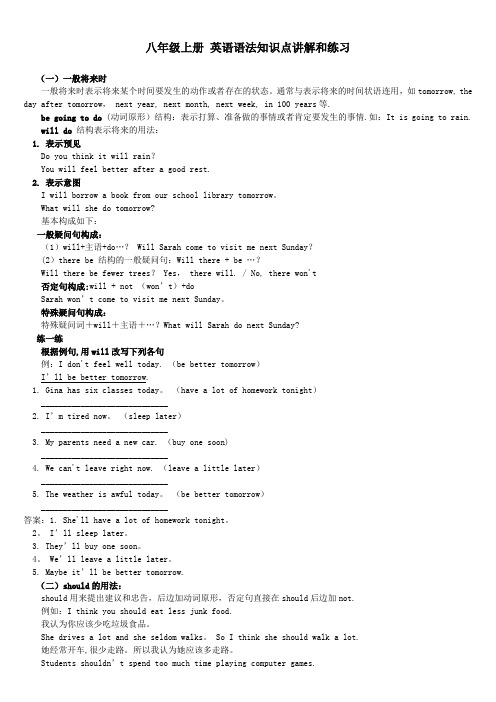
八年级上册英语语法知识点讲解和练习(一)一般将来时一般将来时表示将来某个时间要发生的动作或者存在的状态。
通常与表示将来的时间状语连用,如tomorrow, the day after tomorrow, next year, next month, next week, in 100 years等.be going to do (动词原形)结构:表示打算、准备做的事情或者肯定要发生的事情.如:It is going to rain.will do结构表示将来的用法:1. 表示预见Do you think it will rain?You will feel better after a good rest.2. 表示意图I will borrow a book from our school library tomorrow。
What will she do tomorrow?基本构成如下:一般疑问句构成:(1)will+主语+do…? Will Sarah come to visit me next Sunday?(2)there be 结构的一般疑问句:Will there + be …?Will there be fewer trees? Yes, there will. / No, there won't否定句构成:will + not (won’t)+doSarah won’t come to visit me next Sunday。
特殊疑问句构成:特殊疑问词+will+主语+…?What will Sarah do next Sunday?练一练根据例句,用will改写下列各句例:I don't feel well today. (be better tomorrow)I’ll be better tomorrow.1. Gina has six classes today。
人教版英语八年级上册Unit 6-7Grammar一般将来时语法讲解+练习(含答案)

人教版八年级上册Unit 6 - 7 Grammar一般将来时姓名:_________定义表示将来某一时段的动作或状态;表示将来某一段时间内经常的动作或状态。
例:1)She will have a daughter. 她就快有个女儿了。
2)Call me this evening. I’ll be at home. 今晚给我打电话,我会在家。
结构英语时态通过谓语动词的变形来体现,一般将来时的谓语构成有以下几种情况:will + V原(该结构表示将来某个时间将要发生的动作或状态)【注1】will可以缩写为’ll,如:I will = I’ll he will = he’ll【注2】will不涉及第三人称单数的变形,只有一种形式,后面加动词原形。
例:I will visit Mr. Brown next week. 下周我将去拜访布朗先生。
He will go to Beijing next year. 他明年要去北京。
be going to + V原(该结构表示事先考虑过的将要发生的动作,或已有迹象表明将要发生的某事,意为“打算”、“就要”)例:There is going to be a basketball match tomorrow. 明天会有一场篮球比赛。
We’re going to go on vacation in Sanya this winter. 这个冬天我们计划去三亚度假。
There are lots of dark clouds. It is going to rain. 天上乌云密布,快要下雨了。
be doing,现在进行时表将来。
表示位置转移的动词(如go, come, leave, start, arrive等),可以用现在进行时表将来。
例:They’re leaving for Chongqing. 他们即将前往北京。
The bus is coming. 公交车就要来了。
(完整版)八年级上一般将来时讲解与练习家里
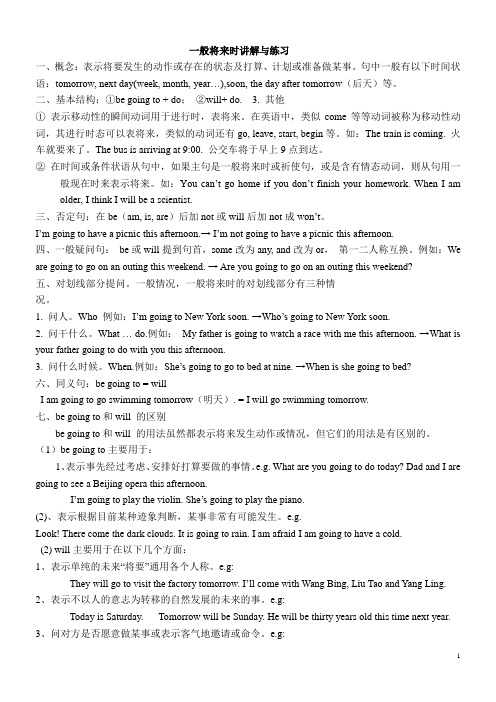
一般将来时讲解与练习一、概念:表示将要发生的动作或存在的状态及打算、计划或准备做某事。
句中一般有以下时间状语:tomorrow, next day(week, month, year…),soon, the day after tomorrow(后天)等。
二、基本结构:①be going to + do;②will+ do. 3. 其他①表示移动性的瞬间动词用于进行时,表将来。
在英语中,类似come等等动词被称为移动性动词,其进行时态可以表将来,类似的动词还有go, leave, start, begin等。
如:The train is coming. 火车就要来了。
The bus is arriving at 9:00. 公交车将于早上9点到达。
②在时间或条件状语从句中,如果主句是一般将来时或祈使句,或是含有情态动词,则从句用一般现在时来表示将来。
如:You can’t go home if you don’t finish your homework. When I am older, I think I will be a scientist.三、否定句:在be(am, is, are)后加not或will后加not成won’t。
I’m going to have a picnic this afternoon.→ I’m not going to have a picnic this afternoon.四、一般疑问句:be或will提到句首,some改为any, and改为or,第一二人称互换。
例如:We are going to go on an outing this weekend. → Are you going to go on an outing this we ekend?五、对划线部分提问。
一般情况,一般将来时的对划线部分有三种情况。
1. 问人。
Who 例如:I’m going to New York soon. →Who’s going to New York soon.2. 问干什么。
初二英语一般将来时讲解及练习

初二英语一般将来时讲解及练习讲解一般将来时表示将来某个时间或某个动作或状态一定会发生或存在的情况。
在英语中,一般将来时的构成主要有两种形式:will/shall + 动词原形和be going to + 动词原形。
will/shall + 动词原形will/shall + 动词原形是一般将来时的最基本形式。
其中,will通常用于第一人称,shall通常用于第二和第三人称。
例如:I will go to the party tomorrow.(我明天去参加聚会。
)He will finish his homework after dinner.(他晚饭后完成他的作业。
)They will have a picnic in the park next weekend.(他们下周末在公园野餐。
)be going to + 动词原形be going to + 动词原形表示将要发生或存在的事情,通常用于未来的计划、意图或打算。
例如:I am going to study abroad next year.(我明年要去留学。
)She is going to visit her grandparents this weekend.(她这个周末要去看她的祖父母。
)We are going to have a meeting next week.(我们下周要开会。
)注意:在使用be going to + 动词原形时,要注意主语和be动词之间的一致性。
例如:He is going to play football.(他将要去踢足球。
)而不能说:He are going to play football.练习题一、用一般将来时填空I (visit) my grandparents next weekend.They (have) a party next Saturday.He (be) a doctor when he grows up.We (travel) to Europe next summer.She (write) a novel someday.They (move) to a new house next month.I (study) hard so I can get into a good college. He (play) the piano at the concert next week. We (have) a meeting tomorrow morning. She (graduate) from high school in two years.二、将下列句子变为一般将来时I study English every day. _She teaches math at the high school.They are going to the movies tonight.He likes to read books in his free time. ___ We have dinner at six o'clock every evening. _ The train arrives at 8:00 in the morning. __ She sings in the choir on Sundays.They play soccer after school. ___He works at a restaurant on weekends. ____ We visit our grandparents once a month. __ 三、用一般将来时完成下列对话A: What are you going to do this weekend? B: I'm going to visit my grandparents.A: That sounds nice. Where do they live?B: They live in the countryside.A: What are you going to do there?B: We're going to have a picnic and go fishing.A: That sounds like fun. Are you going with your parents?B: Yes, my parents and my younger brother are coming too.A: Have a great time!B: Thank you, we will!四、阅读理解My Future PlansMy name is Jack and I'm a sophomore in high school. I have a lot of plans for my future. First of all, I want to go to a good college and study business. I have always been interested in business and I think I would be good at it. After graduation, I plan to start my own business.I want to own a restaurant that serves healthy and delicious food.In order to achieve my goals, I need to work hard in school and get good grades. I also need to learn about managing money and running a business. I have been studying these topics on my own and I plan to take some courses in college.I know it won't be easy, but I'm determined to succeed. I believe that if I work hard and stay focused, I can achieve anything I want.What does Jack want to study in college?What does Jack plan to do after graduation?What kind of restaurant does Jack want to own?What does Jack need to do in order to achieve his goals?What does Jack believe?答案:Jack wants to study business in college.Jack plans to start his own business after graduation.Jack wants to own a restaurant that serves healthy and delicious food.Jack needs to work hard in school, get good grades, learn about managing money and running a business, and take courses in college.Jack believes that if he works hard and stays focused, he can achieve anything he wants.。
一般将来时讲解(附习题+答案)

一般将来时讲解(附习题+答案)一、一般将来时的含义:表示动作发生在将来二、一般将来时的句型:(1) will/shall+动词原形(2) be going to+动词原形三、一般将来时的时间状语:tomorrow(明天)、the day after tomorrow(后天)、next...(下一...): next week(下一周)、next year(明年)、next month(下个月)in+一段时间(...之后): in three days(三天之后)、in the future在未来this evening(今天晚上)四、一般将来时的句型结构:(1) will/shall+动词原形(will not =won’t)(will 各种人称均可用,shall 只能用于第一人称)1)肯定句:主语+will/shall+动词原型...如:I will go to school tomorrow.我明天将会去学校He will go to school tomorrow.他明天将会去学校。
2)否定句:主语+will/shall+not+动词原型...如:I won’t go to school tomorrow.我明天将不会去学校。
He won’t go to school tomorrow.他明天将不会去学校。
3)一般疑问句:Will/Shall +主语+动词原型...如:Will you go to school tomorrow?你明天要去学校吗?Will he go to school tomorrow?他明天要去学校吗?肯定回答:Yes, 主语+will.如:Yes, I will.Yes, he will.否定回答:No,主语+will+not.如:No, I won’t.No, he won’t.4) 特殊疑问句:特殊疑问词+will/shall+主语+动词原型...如:What will you do tomorrow?你明天将会做什么?What will he do tomorrow?他明天将会做什么?(2) be going to+动词原形1)肯定句:主语+be going to +动词原型...如:I am going to buy some books tomorrow.我明天打算去买一些书。
一般将来时讲义和翻译练习人教版英语八年级上册
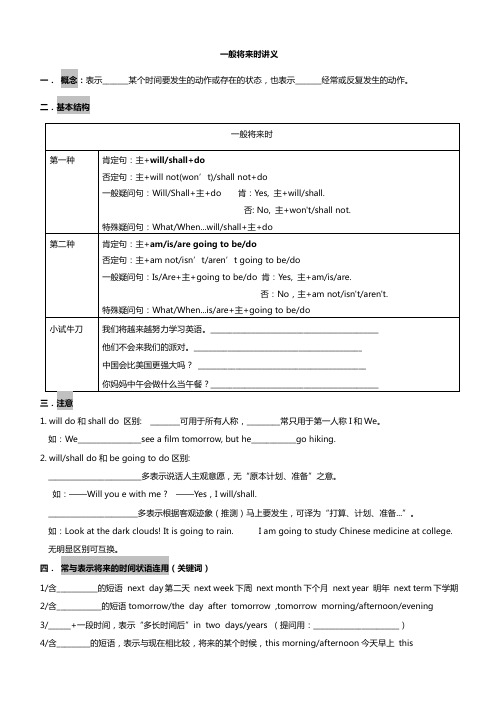
一般将来时讲义一.概念:表示_______某个时间要发生的动作或存在的状态,也表示_______经常或反复发生的动作。
二.基本结构1.will do和shall do 区别: ________可用于所有人称,_________常只用于第一人称I和We。
如:We_________________see a film tomorrow, but he____________go hiking.2.will/shall do和be going to do区别:_________________________多表示说话人主观意愿,无“原本计划、准备”之意。
如:——Will you e with me ? ——Yes,I will/shall.________________________多表示根据客观迹象(推测)马上要发生,可译为“打算、计划、准备...”。
如:Look at the dark clouds! It is going to rain. I am going to study Chinese medicine at college. 无明显区别可互换。
四.常与表示将来的时间状语连用(关键词)1/含___________的短语next day第二天next week下周next month下个月next year 明年next term下学期2/含____________的短语tomorrow/the day after tomorrow ,tomorrow morning/afternoon/evening3/______+一段时间,表示“多长时间后”in two days/years (提问用:_______________________)4/含_________的短语,表示与现在相比较,将来的某个时候,this morning/afternoon今天早上thisWednesday/weekend这周三/末5/_________ 引导的表示将来的时间状语从句What will you do when he grows up?6/________ ________(还有多久)问句中How soon will he go home? (回答用_________+一段时间)7/ 单个的短语soon(不久)tonight(今晚)some day(将来的某一天)one day(将来的某一天)in the future(在未来)before long (不久后)from now on(从现在开始)8/注意部分时间词要根据语境来判断是否是将来。
初中英语 人教版八年级上册语法专项-一般将来时讲解+时态混合练习题(含答案)

一般将来时讲解与时态混合练习题“be going to+动词原形”是一般将来时的一种表达形式,表示将要发生的动作或情况,be动词随主语的人称和数的变化而变化。
1.肯定句:主语+be going to+动词原形+其他2.否定句:主语+be not going to+动词原形+其他.3.一般疑问句:Be+主语+going to+动词原形+其他?肯定回答:Yes,主+be.否定回答:No,主语+be not.4.特殊疑问句:疑问词+be+主语+going to+动词原形+其他?用法:(1)表示将要发生的动作或安排,或打算、计划、决定要做的事。
(2)表示主语根据当前的情况做出的预测。
通常是有迹象表明某事即将发生,表达说话人较肯定的判断,指即将发生或肯定要发生的事,常用于I'm sure,I'm afraid或I think等后面。
(3)常与be going to连用的时间状语be going to 表达的是未发生的动作,因此常与一些表示将来的时间状语连用。
例如:tomorrow,this evening,next month,in three weeks等。
有时也可与before, after等引导的时间状语从句连用。
一般将来时1)一般将来时的构成:1. 助动词will(shall)+动词原形2. am / is / are+going to +动词原形2)一般将来时的用法:1.将要发生的动作。
例如:I will leave for Beijing tomorrow.2.将要存在的状态。
例如:This time next year I will be in Japan. Where will you be?3.打算要做的事。
例如:Are you going to watch the film on television tonight?3)常用于一般将来时的时间状语:tomorrow、next week、in 2008等。
初中数学一般将来时讲解及练习

初中数学一般将来时讲解及练习
一般将来时是指将来某个时间或某个动作的一种表达方式。
在
初中数学中,我们常常使用一般将来时来描述数学问题的未来情况。
一般将来时的构成
一般将来时的构成较为简单,一般由“将来时助动词 + 动词原形”组成。
例如:
- 我将研究数学。
- 他们将去参观博物馆。
- 明天我们将参加数学竞赛。
一般将来时的用法
一般将来时通常用于以下情况:
1. 表示将来的计划或打算:
- 明天我将去图书馆研究。
- 下周我将报名参加数学培训班。
2. 表示预测或猜测:
- 根据天气预报,明天将会下雨。
- 他们明年将取得更好的成绩。
3. 表示意愿或请求:
- 我明天将帮你复数学知识。
- 你能否帮我解决这个数学问题?
一般将来时的练
请根据以下句子,用一般将来时构成正确的句子:
1. 我们明天(去)参加数学竞赛。
2. 你下个月(参观)科学博物馆。
3. 下周我(研究)数学。
1. 我们明天将去参加数学竞赛。
2. 你下个月将参观科学博物馆。
3. 下周我将研究数学。
以上是关于初中数学一般将来时的讲解及练习。
希望对你有所帮助!。
初二英语一般将来时讲解及练习

初二英语一般将来时讲解及练习一般将来时的定义是指表示将来某一时间将要发生的动作或存在的状态,也可以表示将来经常或重复发生的动作。
一般将来时的标志词包括明天、后天、明年、下一个月、下一个星期等。
一般将来时的构成有两种形式,一种是主语+be(am,is,are) going to+do+。
另一种是主语+will/shall+do+。
其中,will和shall可以互换使用,但shall只能用于第一人称,即主语是I 或we。
后面接动词原形。
肯定句的构成可以是主语+be(am,is,are) going to+do+。
或者主语+will/shall+do+。
否定句则是在be动词(am。
is。
are)后加not或will后加not成won’t。
例如,明天我将要踢足球可以表示为I am going to play football tomorrow或者I will play XXX。
而明天我不将踢足球则可以表示为I am not going to play XXX。
另外,明年她不将参观上海可以表示为She is not/isn't going to visit Shanghai next year。
2.A) I will not go to school the day after tomorrow。
B) I XXX。
C) XXX.3.1)A) Am I going to see my XXX。
Yes。
you are。
B) Are you going to listen to the tape tomorrow。
No。
I'm not。
C) Is she going to Beijing next year。
Yes。
she is.2)A) XXX class。
Yes。
you will。
B) Will you come here next week。
Yes。
I will。
C) Will she teach us this term。
人教版英语八年级上册 Unit6-7语法重点:一般将来时_专项讲解与练习 (有答案)
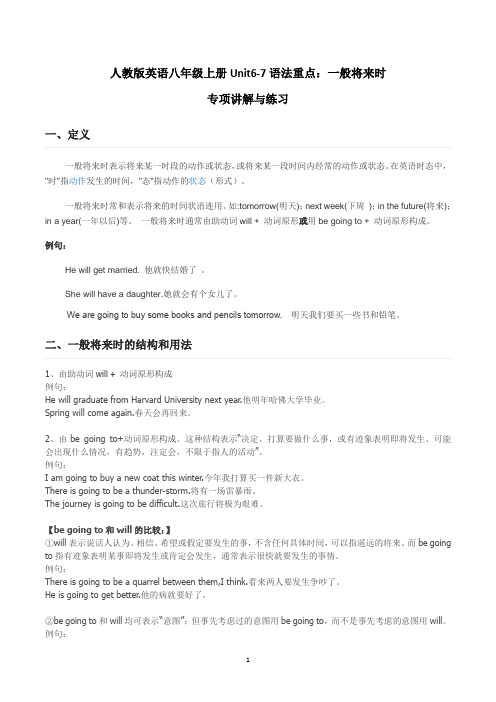
人教版英语八年级上册Unit6-7语法重点:一般将来时专项讲解与练习一般将来时表示将来某一时段的动作或状态,或将来某一段时间内经常的动作或状态。
在英语时态中,"时"指动作发生的时间,"态"指动作的状态(形式)。
一般将来时常和表示将来的时间状语连用。
如:tomorrow(明天);next week(下周);in the future(将来);in a year(一年以后)等。
一般将来时通常由助动词will + 动词原形或用be going to + 动词原形构成。
例句:He will get married. 他就快结婚了。
She will have a daughter.她就会有个女儿了。
We are going to buy some books and pencils tomorrow. 明天我们要买一些书和铅笔。
1、由助动词will + 动词原形构成例句:He will graduate from Harvard University next year.他明年哈佛大学毕业。
Spring will come again.春天会再回来。
2、由be going to+动词原形构成。
这种结构表示“决定、打算要做什么事,或有迹象表明即将发生、可能会出现什么情况,有趋势,注定会,不限于指人的活动”。
例句:I am going to buy a new coat this winter.今年我打算买一件新大衣。
There is going to be a thunder-storm.将有一场雷暴雨。
The journey is going to be difficult.这次旅行将极为艰难。
【be going to和will的比较:】①will表示说话人认为、相信、希望或假定要发生的事,不含任何具体时间,可以指遥远的将来。
而be going to指有迹象表明某事即将发生或肯定会发生,通常表示很快就要发生的事情。
(完整版)八年级上册一般将来时用法讲解及练习
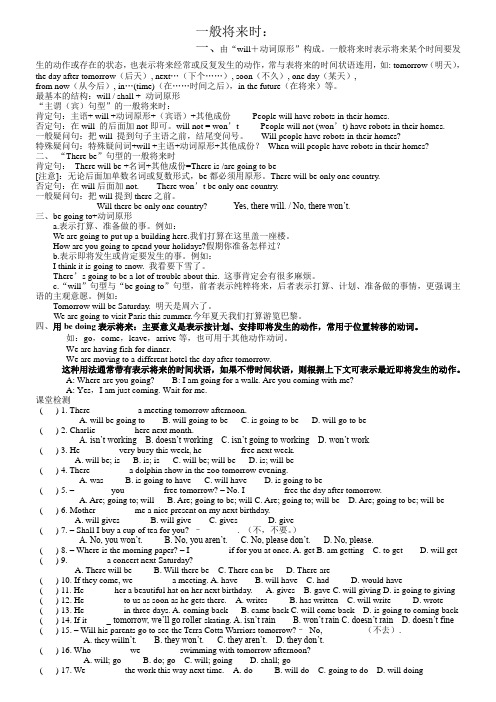
一般将来时:一、由“will+动词原形”构成。
一般将来时表示将来某个时间要发生的动作或存在的状态,也表示将来经常或反复发生的动作,常与表将来的时间状语连用,如: tomorrow(明天),the day after tomorrow(后天), next…(下个……), soon(不久), one day(某天),from now(从今后), in…(time)(在……时间之后),in the future(在将来)等。
最基本的结构:will / shall + 动词原形“主谓(宾)句型”的一般将来时:肯定句:主语+ will +动词原形+(宾语)+其他成份People will have robots in their homes.否定句:在will 的后面加not即可。
will not = won’t People will not (won’t) have robots in their homes.一般疑问句:把will 提到句子主语之前,结尾变问号。
Will people have robots in their homes?特殊疑问句:特殊疑问词+will +主语+动词原形+其他成份?When will people have robots in their homes?二、“There be”句型的一般将来时肯定句:There will be +名词+其他成份=There is /are going to be[注意]:无论后面加单数名词或复数形式,be都必须用原形。
There will be only one country.否定句:在will后面加not. There won’t be only one country.一般疑问句:把will提到there之前。
Will there be only one country? Yes, there will. / No, there won’t.三、be going to+动词原形a.表示打算、准备做的事。
- 1、下载文档前请自行甄别文档内容的完整性,平台不提供额外的编辑、内容补充、找答案等附加服务。
- 2、"仅部分预览"的文档,不可在线预览部分如存在完整性等问题,可反馈申请退款(可完整预览的文档不适用该条件!)。
- 3、如文档侵犯您的权益,请联系客服反馈,我们会尽快为您处理(人工客服工作时间:9:00-18:30)。
一般将来时:一、由“will+动词原形”构成。
一般将来时表示将来某个时间要发生的动作或存在的状态,也表示将来经常或反复发生的动作,常与表将来的时间状语连用,如: tomorrow(明天),the day after tomorrow(后天), next…(下个……), soon(不久), one day(某天),from now(从今后), in…(time)(在……时间之后),in the future(在将来)等。
最基本的结构:will / shall + 动词原形“主谓(宾)句型”的一般将来时:肯定句:主语+ will +动词原形+(宾语)+其他成份People will have robots in their homes.否定句:在will 的后面加not即可。
will not = won’t People will not (won’t) have robots in their homes.一般疑问句:把will 提到句子主语之前,结尾变问号。
Will people have robots in their homes?特殊疑问句:特殊疑问词+will +主语+动词原形+其他成份?When will people have robots in their homes?二、“There be”句型的一般将来时肯定句:There will be +名词+其他成份=There is /are going to be[注意]:无论后面加单数名词或复数形式,be都必须用原形。
There will be only one country.否定句:在will后面加not. There won’t be only one country.一般疑问句:把will提到there之前。
Will there be only one country? Yes, there will. / No, there won’t.三、be going to+动词原形a.表示打算、准备做的事。
例如:We are going to put up a building here.我们打算在这里盖一座楼。
How are you going to spend your holidays?假期你准备怎样过?b.表示即将发生或肯定要发生的事。
例如:I think it is going to snow. 我看要下雪了。
There’s going to be a lot of trouble about this. 这事肯定会有很多麻烦。
c.“will”句型与“be going to”句型,前者表示纯粹将来,后者表示打算、计划、准备做的事情,更强调主语的主观意愿。
例如:Tomorrow will be Saturday. 明天是周六了。
We are going to visit Paris this summer.今年夏天我们打算游览巴黎。
四、用be doing表示将来:主要意义是表示按计划、安排即将发生的动作,常用于位置转移的动词。
如:go,come,leave,arrive等,也可用于其他动作动词。
We are having fish for dinner.We are moving to a different hotel the day after tomorrow.这种用法通常带有表示将来的时间状语,如果不带时间状语,则根据上下文可表示最近即将发生的动作。
A: Where are you going? B: I am going for a walk. Are you coming with me?A: Yes,I am just coming. Wait for me.课堂检测( ) 1. There __________ a meeting tomorrow afternoon.A. will be going toB. will going to beC. is going to beD. will go to be( ) 2. Charlie ________ here next month.A. isn’t workingB. doesn’t workingC. isn’t going to workingD. won’t work( ) 3. He ________ very busy this week, he ________ free next week.A. will be; isB. is; isC. will be; will beD. is; will be( ) 4. There ________ a dolphin show in the zoo tomorrow evening.A. wasB. is going to haveC. will haveD. is going to be( ) 5. –________ you ________ free tomorrow? – No. I ________ free the day after tomorrow.A. Are; going to; willB. Are; going to be; willC. Are; going to; will beD. Are; going to be; will be ( ) 6. Mother ________ me a nice present on my next birthday.A. will givesB. will giveC. givesD. give( ) 7. – Shall I buy a cup of tea for you? –________. (不,不要。
)A. No, you won’t.B. No, you aren’t.C. No, please don’t.D. No, please.( ) 8. – Where is the morning paper? – I ________ if for you at once. A. get B. am getting C. to get D. will get ( ) 9. ________ a concert next Saturday?A. There will beB. Will there beC. There can beD. There are( ) 10. If they come, we ________ a meeting. A. have B. will have C. had D. would have( ) 11. He ______ her a beautiful hat on her next birthday. A. gives B. gave C. will giving D. is going to giving ( ) 12. He ________ to us as soon as he gets there. A. writes B. has written C. will write D. wrote ( ) 13. He ________ in three days. A. coming back B. came back C. will come back D. is going to coming back ( ) 14. If it _____ tomorrow, we’ll go roller-skating. A. isn’t rain B. won’t rain C. doesn’t rain D. doesn’t fine ( ) 15. – Will his parents go to see the Terra Cotta Warriors tomorrow?–No, ________ (不去).A. they will n’t.B. they won’t.C. they aren’t.D. they don’t.( ) 16. Who ________ we ________ swimming with tomorrow afternoon?A. will; goB. do; goC. will; goingD. shall; go( ) 17. We ________ the work this way next time. A. do B. will do C. going to do D. will doing( ) 18. Tomorrow he ________ a kite in the open air first, and then ________ boating in the park.A. will fly; will goB. will fly; goesC. is going to fly; will goesD. flies; will go( ) 19. The day after tomorrow they ________ a volleyball match.A. will watchingB. watchesC. is watchingD. is going to watch( ) 20. There ________ a birthday party this Sunday.A. shall beB. will beC. shall going to beD. will going to be( ) 21. They ________ an English evening next Sunday.A. are havingB. are going to haveC. will havingD. is going to have( ) 22. ________ you ________ free next Sunday? A. Will; are B. Will; be C. Do; be D. Are; be ( ) 23. He ________ there at ten tomorrow morning. A. will B. is C. will be D. be( ) 24. ________ your brother ________ a magazine from the library?A. Are; going to borrowB. Is; going to borrowC. Will; borrowsD. Are; going to borrows( ) 25. – Shall I come again tomorrow afternoon?–________ (好的).A. Yes, pleaseB. Yes, you will.C. No, please.D. No, you won’t.( ) 26. It ________ the year of the horse next year.A. is going to beB. is going toC. will beD. will is( ) 27. ________ open the window? A. Will you please B. Please will you C. You please D. Do you ( ) 28. –Let’s go out to play football, shall we? – OK. I ________.A. will comingB. be going to comeC. comeD. am coming( ) 29. It ________ us a long time to learn English well. A. takes B. will take C. spends D. will spend ( ) 30. The train ________ at 11. A. going to arrive B. will be arrive C. is going to D. is arriving二、动词填空。
